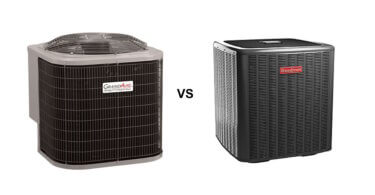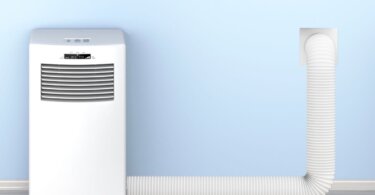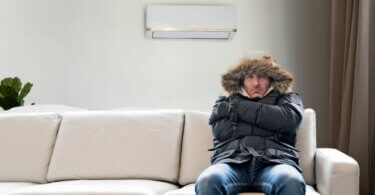The summertime is when most people like to use their air conditioners to keep them cool. However, what if you are at a worksite where access to power might be difficult? Or what if you want to run an AC in your RV and are not connected to the grid?
In this case, you would need to buy or rent a generator to run your AC. But with so many different generators on the market, which one should you choose? This post will help you decide which size generator to buy or rent to run your AC.

- What Size Generator to Run an Air Conditioner
- Best Generators to Run an Air Conditioner
- Will a 7,500-Watt Generator Run My Air Conditioner?
- What Generator Can Power An AC?
- Can a 3.5 KVA Generator Power An AC?
- Will a 12,000 Watt Generator Run Central Air?
- Will a 10,000 Watt Generator Run Central Air?
- Final Thoughts
What Size Generator to Run an Air Conditioner
On average, a central air conditioner uses 3,000 and 3,500 watts per hour, and a window air conditioner between 500 to 1,500 watts per hour. But when the device starts, some ACs need 2 to 3 times as many watts for a few seconds to start the compressor.
How To Calculate The Generator Size To Run Your Air Conditioner?
When determining what size generator to run an AC, consider a few things. The first is the running wattage of the AC unit. Most units will have a label that lists the wattage requirements. For example, a standard window air conditioner might require 1,000 watts.
The second thing to consider is the start-up or surge wattage. This is the amount of power required to get the AC unit started. It is usually much higher than the running wattage and can be as high as three times the running wattage. Start-up or surge wattage can be found in the owner’s manual or on the AC unit itself.
You can find the running wattage and the start-up or surge wattage on the generator specifications.
Tip: if you can’t find the wattage of your AC, just check the model number on your AC and search for the specifications or manual online to find the wattage.
Once you know the wattage requirements of the AC unit, you can select a generator that can provide that power. For example, a standard window air conditioner might require 2,000 watts for starting and 1,000 watts for running. In that case, you would need a generator that can provide at least 1,000 watts of running power and 2,000 watts of surge wattage to start up your AC.
If you can’t find the wattage size, you can use the AC Unit Size which is measured in Tons and BTUs on your Air Conditioner. You can calculate the number of tons by dividing the number of BTUs by 12,000.
| BTU | Ton (size of AC) | Approx. Watts | Kilowatts (kW) |
|---|---|---|---|
| 12,000 | 1 | 4,000 | 4 |
| 18,000 | 1.5 | 6,000 | 6 |
| 24,000 | 2 | 8,000 | 8 |
| 36,000 | 3 | 12,000 | 12 |
| 48,000 | 4 | 15,000 | 15 |
| 60,000 | 5 | 18,000 | 18 |
Best Generators to Run an Air Conditioner
There are a few types of generators that can be used to run an air conditioner. The most common type is a gas generator, followed by diesel and propane generators.
Gas generators are the most popular choice because they are typically less expensive than diesel or propane generators, and they offer a longer runtime.
Diesel generators are a good choice for those who need a generator to handle a heavy load, such as running an air conditioner.
Propane generators are suitable for those who want a portable generator that is easy to store.
The following is a list of some of the most popular generators that can be used to run an air conditioner:
1) DuroMax XP15000E Gas Powered Portable Generator
This powerful generator by DuroMaxis powered by V-Twin Engine. The generator offers a powerful 12,000 running Watts, which is ideal for a heavy-duty power supply.
This V-Twin engine produces 23 horsepower which is pretty huge for home and job sites. It also has an operating volume of 74 dBA which is generic for most generators.
On this device, you get four outlets to choose from; 120/240V 50A heavy duty outlet, 120V 30A twist-lock outlet, 120V 20A GFCI outlet, and a 120/240V 30A twist-lock outlet.
The generator has a huge 10.8-gallon fuel tank which can run for approximately nine hours at 50 percent load. When the fuel is low, the sensor automatically shuts off the device.
2) Champion Power 3500W Equipment Portable Generator
The Champion Power generator comes with enough power to start and run a 15,000 BTU RV air conditioner. It is embedded with a 224cc engine that produces 3500 running watts with gasoline, which is sufficient to run an air conditioner. The size of its fuel tank is 3.4 gallons, which can run for nine hours at 50 percent load using gasoline.
It produces 3,150 running watts and can run for 10.5 hours at 50 percent load using 20-pound propane. With 68 dBA, the generator’s noise is pretty easy on human ears.
It offers four outlets; two 120V 20A household outlets, one 120V 30A locking outlet, and one 120V 30A RV.
3) WEN GN6000 6000-Watt Portable Generator
WEN manufactures one of the most affordable generators that is filled with great features and specifications. This 6,000W generator produces 500 running watts, which is sufficient to run an air conditioner. The size of the fuel tank is 3.4 gallons which can run for 7.5 hours at 50 percent load.
The generator is powered by a 272cc, 4-stroke, OHV engine. Also, its speed is quite average, at 3,600 RPM.
The device offers six outlets: one 12-Volt DC outlet, 2 standard household outlets (5-20R), one 120-Volt/240-Volt L14-30R outlet, one 30 Amp TT-30R RV outlet, and a 120-Volt to 240-Volt voltage selector.
4) Champion 3,400-Watt Portable Inverter Generator
The Champion 3,400W dual fuel generator can run either on propane or gasoline. The generator offers 3,100 running watts, which is perfect for powering a window air conditioner. This generator was specifically designed for RV and comes with a dedicated 120V 30 amp RV outlet.
The noise level of the device is 58 dBA, which is not disturbing to human ears. It offers four outlets: 2 x 120V 20A outlets, 120V 30A RV outlet, and 1 x 12V USB port.
The engine is a 192cc 4-stroke air-cooled single-cylinder engine. The size of the fuel tank is 1.6 gallons. Its run time is 7.5 hours with gas at 25 percent load capacity and 14.5 hours with propane at 25 percent load capacity.
5) Buffalo Tools GEN1000I 1000 Watt Inverter Generator
This is the smallest generator on our list and it is sufficient to power a small air conditioner installed in an RV. It is extremely quiet and operates at a noise level of 56 decibels. It produces 1,000 watts of power to keep the devices running during power cuts.
It has a small tank of up to 0.55 gallons of fuel. This tank can offer a runtime of about 6 hours at 50% load. The control panel consists of a 120V DC outlet and a 120V AC outlet. The smart eco-mode will improve fuel efficiency by managing the engine’s RPM.
Will a 7,500-Watt Generator Run My Air Conditioner?
Always make sure you know the wattage of your air conditioner first. Generally speaking, a 7,500-watt generator should be sufficient to power a typical air conditioner. However, if you’re also running other appliances or electronics off the generator, you may need to choose a larger model.
Ultimately, it is best to consult with an expert to ensure you select the right generator for your needs.
What Generator Can Power An AC?
There are a few different types of generators that can power an AC. The most common type is a gasoline generator. These are typically used for emergencies, as they are portable and easy to use.
However, they can be noisy and produce harmful fumes. Another option is a propane generator.
Finally, there are solar-powered generators. These are the most environmentally-friendly option, but they can be more expensive and require more maintenance than other types of generators.
These are also portable and easy to use, but they don’t produce fumes and are quieter than gasoline generators.
Other than the various types of generators mentioned above, you may also use a portable power station to power an air conditioning unit. Generally, portable power stations, also known as battery-powered inverter generators, refer to devices for storing electrical power in an internal battery for future use.
Unlike other types of generators, portable power stations don’t use fuel to operate. They have no engine and moving parts, making them quiet, easy to maintain, and safe from fire hazards. They’re also eco-friendly and safe to use indoors because they don’t emit carbon dioxide. Since they work by turning the battery’s direct current (DC) into an alternating current (AC). This makes them capable of powering electronics like laptops and phones.
More importantly, you may also use a portable power station to power an AC unit, subject to certain requirements. For instance, you need to calculate certain specifications, like the watt-hours and total voltage output of your device, the wattage and voltage requirements of your AC, and the amperes that your AC will consume. With these requirements, you can figure out if your device is powerful enough to power an AC for a long time. You can check some product websites online to know more about the best portable power station for your home.
Can a 3.5 KVA Generator Power An AC?
The answer to this question is yes, but it depends on the specific generator and the AC unit model.
For example, a 3.5 KVA generator with a maximum wattage output of 2,800 watts can theoretically power a typical 24,000 BTU (British Thermal Units) AC unit.
However, this is assuming that the AC unit is the only thing running off of the generator. If you try to run additional appliances or devices off of the same generator, you may overload it and cause damage.
Will a 12,000 Watt Generator Run Central Air?
A 12,000-watt generator can provide enough power to run a central air conditioner, but the specific requirements will depend on the model of the AC unit.
A standard central air conditioner will require about 3,000-3,500 watts of power to operate.
However, some newer and more energy-efficient models may only require 1,000-2,000 watts.
So, it is essential to check the specific requirements of your AC unit before purchasing a generator so that you are not spending more than you need.
Will a 10,000 Watt Generator Run Central Air?
A 10,000-watt generator will be able to provide enough power to keep your central air conditioner running, even during extended periods.
However, it’s important to note that the amount of power required will vary depending on the size and efficiency of your AC unit.
Final Thoughts
We hope we have been able to answer your queries about the best generators for your air conditioners!
Related article: Best Portable Air Conditioner For Camping





Leave a Comment